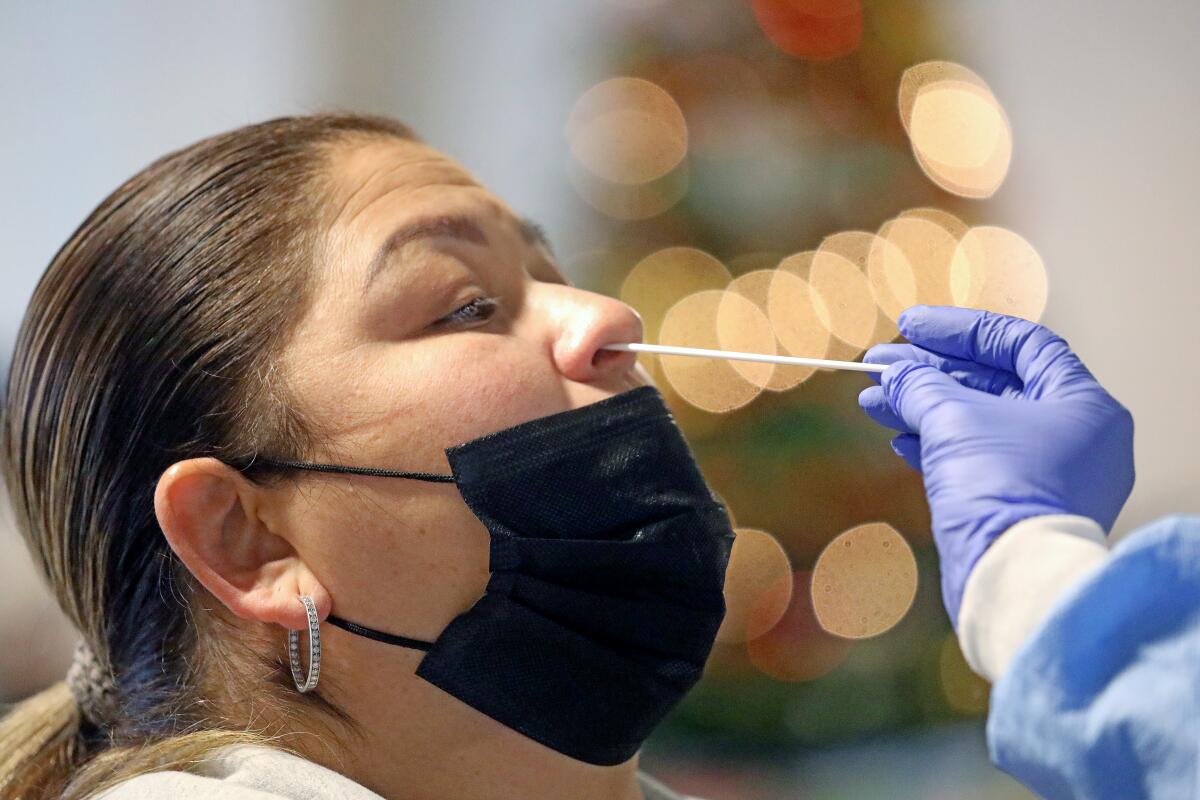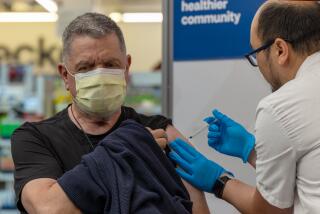Don’t be fooled by fake COVID test scammers. Here’s what to avoid

Among the pandemic’s many challenges has been the rise of scammers using phone calls, text messages, social media and door-to-door visits to perpetuate COVID-19-related cons. Both the federal Department of Health and Human Services and the state attorney general’s office have issued warnings this month, with California Atty. Gen. Rob Bonta saying scammers were taking advantage of a shortage of COVID tests to exploit vulnerable people trying to find out if they have the virus.
Here’s an example. The Orange County Health Care Agency tweeted about reports of pop-up testing operations that may have been unlicensed. Orange County’s 2nd District Supervisor Katrina Foley said, “While we have not heard any direct reports of fake pop-up sites, I encourage anyone with concerns to contact our office to verify the location and report any suspected fraud to local authorities.” Contact her office at (714) 834-3220 for assistance.
On Jan. 11, the Los Angeles County Board of Supervisors gave the county’s departments of health, consumer affairs and public safety 30 days to examine the risks of fraudulent tests and develop a communications and crackdown strategy.
In the meantime, county officials and federal health agencies have provided guidance on how to identify a fake testing site and where to report it.
Tips on verifying a testing site
If you doubt the legitimacy of a pop-up testing site, check with one of the following sources:
- The California Department of Public Health’s online search tool, which allows users to look for a site by address or on a map.
- Your local county government‘s COVID-related information page, which is likely to include a list of testing sites, such as the Los Angeles County web page .
- Latino Health Access, which is working with Orange County to help people get tested. The organization can be reached at (714) 805-7838 Monday through Friday.
What to expect at a legitimate testing site
If you visit a proper testing site, Anza Vang, Orange County’s deputy chief of public health services strategy and development and Keven Chavez, public information officer for L.A. County’s Department of Consumer and Business Affairs, said, you will be asked for your first and last name, your date of birth, how you prefer to receive your test result, and your insurance information.
This information is collected so the site can claim reimbursement from your insurance company or, if you’re not insured, the federal government, Chavez said. “This is why there is no out-of-pocket cost to individuals needing testing,” he said.
When going to a testing site claiming to be run by the county or one of its partners, Chavez said, people should look for signage that includes the county logo and the vendor’s name — for example, “L.A. County and Fulgent” or “L.A. County and CORE.”
“Approved sites are strategically located at schools, parks, YMCAs, and churches,” he said. “Neither L.A. County nor our partners set up on city sidewalks.”
Orange County currently does not operate any testing sites itself, Vang said. However, the county has made testing available in partnership with community-based organizations at neighborhood sites, including churches, schools, senior centers, the Orange County Fair & Event Center and the Anaheim Convention Center.
Both counties said staff at their vendors’ sites should be wearing a full set of personal protective equipment, including masks, gowns, gloves and possibly face shields. Chavez noted that Orange County’s vendor sites typically have name tags, but the protective equipment might cover them.
Legitimate L.A. County testing sites perform only one type of test — PCR tests, not rapid antigen ones — and samples are collected using a nasal swab.
Chavez said participating community clinics, healthcare providers and other agencies that give tests may ask for your insurance information or ask you to enroll in a government program so that they can be reimbursed for the cost of the test. Private testing sites may ask for payment, but sites working with L.A. County will not charge for their services.
“Please keep in mind that the county does not endorse or regulate all COVID-19 testing sites,” he said.
If you’re in doubt, ask questions
Healthcare fraud is a concern, Vang said, and patients can avoid it by asking the provider questions such as:
- What is involved in the process of getting tested?
- How will the information collected be used?
- What codes will be used to bill insurance, or what will the cost be for the service?
- What laboratory is associated with this testing site?
- Can I see your healthcare credentials?
Chavez said all reputable testing sites should also provide a way for clients to obtain their test results, such as by calling a toll-free number or via email.
What to look out for
Some warning signs that local officials shared include:
- A provider asking about your nationality or immigration status
- A site asking for your Social Security number
- No notice of privacy practices provided, or no explanation for how your personal data will be used
- A provider demanding to see your passport or driver’s license when you have other documents that show your insurance status
- Employees at the site who are not wearing full protective gear
- Misspellings or unusual names in the URL for the website where the testing provider required you to sign up online
- Misspellings in forms that ask for personal information
- An unsolicited call or text from the testing site. If you receive one, do not provide any personal information until you have confirmed that source of the call or text is legitimate
How to report a suspected scam
If you believe you have been scammed by a fake COVID-19 testing site, report it to your local police department or sheriff’s office, and file a complaint online with the California attorney general’s office or by phone with the HHS inspector general’s office at (800) 447-8477. L.A. County residents can contact the county Department of Consumer and Business Affairs online or at (800) 593-8222.
More to Read
Sign up for Essential California
The most important California stories and recommendations in your inbox every morning.
You may occasionally receive promotional content from the Los Angeles Times.











